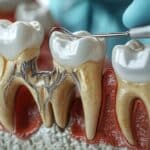The Hidden Costs of Delaying Dental Implant Treatment
Are you exploring dental implant treatment as the best remedy for your missing or failing teeth? If so, it’s only natural to be interested in how much you can expect to pay. At New Teeth Now, we tailor our treatment plans to meet the specific needs of each patient, and we’ll be happy to help you consider all the steps in the process as well as the total cost involved.
In any cost-benefit analysis, though, it’s important to consider the price of every option—including doing nothing—before making a decision. Therefore, if you’re one of the many people weighing the pros and cons of dental implants in terms of cost, you’ll want to consider all the ways you’re paying for your deteriorating oral health even as you evaluate the financial investment required for full mouth dental implants.
For example, here’s a cost you might not have thought about: the lost freedom to be yourself when you’re with others. Get-togethers should be fun-filled times when the menu includes steady streams of laughter along with food and drink. However, many people with missing or damaged teeth worry that a spontaneous smile will expose their unsightly secret. They may forgo sampling tasty treats or chatting naturally with friends or colleagues. They may even decline social invitations altogether.
In the above scenario, the hidden cost of delaying a permanent solution for serious dental problems lies in the diminished quality of life. And that’s just one of the numerous costs associated with procrastination. In this article, we’ll look at a few of the less-obvious ways you may be paying a high price by not pursuing dental implant treatment. (Are you wondering whether you’re a good candidate for full mouth dental implants? Take this quiz from New Teeth Now, one of the nation’s top providers of cutting-edge dental implants, to find out.)
How bad or missing teeth affect overall health
Tooth loss often results from advanced periodontal disease, which refers to chronic gum infection. Some studies have linked gum disease and missing or failing teeth with a wide variety of potentially serious health effects, including:
Heart disease
Researchers haven’t firmly established whether gum disease causes cardiovascular problems, but a number of studies have found a correlation between the two. One theory is that the bacteria that cause periodontal disease travel to the heart via the bloodstream. In fact, researchers have identified Porphyromonas gingivalis (P. gingivalis), the main pathogen that causes periodontitis, as the most common type of bacteria found in coronary arteries. If you have advanced periodontal disease, full mouth dental implants may help lower your risk of heart disease.
Dementia
The National Institute on Aging recently studied more than 6,000 participants to explore possible links between gum disease and Alzheimer’s disease, which is the most common form of dementia in the U.S. The study followed up on previous research that indicated the human brain forms plaques of beta-amyloid protein, one of the most recognizable identifiers of Alzheimer’s disease, in response to infection by P. gingivalis. The NIA study found that, among participants age 65 and older, both Alzheimer’s diagnoses and deaths were associated with the development of antibodies against P. gingivalis.
The study’s authors have cautioned that more research is needed to determine whether periodontal disease treatment, such as full mouth dental implants, can help prevent dementia. However, the NIA study and other research have revealed a link between gum disease and dementia.
Cancer
A number of studies have investigated whether tooth loss plays a role in the development of cancer. These studies are ongoing, but researchers have identified a link between excess tooth loss and the development of upper gastrointestinal malignancies, including cancer of the esophagus, stomach and small intestine.
Reduced lifespan
In general, several studies have linked extensive tooth loss with premature death, possibly due to malnutrition caused by the inability to chew many types of food. Full mouth dental implants that support zirconia teeth can restore up to 85% of a person’s original bite force. That’s over three times the bite force delivered by dentures, and it translates into the ability to eat just about anything that could be chewed with healthy natural teeth.
How tooth loss affects your appearance – even if you never smile
Another hidden cost of delaying dental implant treatment is bone loss that results from advanced gum disease or missing teeth. The underlying bony structure that supports your teeth can be eroded by the chronic inflammation of gum tissue. Additionally, when you have a missing tooth, the underlying bone can shrink due to a process known as resorption. This occurs because of the relationship between your teeth and jawbone.

When a healthy tooth is rooted in the jawbone, the pressure created by biting and chewing helps keep the bone strong. When that tooth is pulled or falls out, the routine pressure on the adjacent bone goes away. Over time, the body begins to reabsorb some of the bone cells surrounding a missing tooth—as much as 25% in the first year after the tooth is removed, according to experts.
Thanks to bone shrinkage, missing teeth potentially create an aesthetic concern that’s far greater than noticeable gaps between teeth. Why? Because if a person loses multiple teeth without replacing them, the loss of structural support provided by the jawbone is likely to cause unwelcome facial changes. These often include sunken cheeks and sagging skin around the lips. Structural facial changes like these can make you look grumpy or older than you are, even if you never reveal your missing teeth by opening your mouth.
How so-called ‘affordable’ options may cost more in the end
Dentures and other removable dental appliances are often billed as more affordable alternatives to full mouth dental implants, but they come with hidden costs. For example, when it comes to smiling and chewing, dentures can help fill gaps left by missing teeth, but they won’t do the same job as dental implants when it comes to strengthening the jawbone. As bone loss progresses, you’ll likely need adjustments to keep your dentures fitting properly—adjustments that you’ll be billed for.
What’s more, dentures require periodic replacement, even if they’re diligently cleaned and worn properly. The American Dental Association recommends that patients with dentures have them professionally re-evaluated at least every five years—and sooner if there have been changes to neighboring teeth since the dentures were fabricated.
On the other hand, full mouth dental implants, when properly maintained, are a one-and-done solution. Choosing this option also means you’ll avoid the ongoing costs of special daily cleaning products and denture adhesives because implants generally require the same type of care as natural teeth.
Are you considering a dental bridge? It’s important to recognize that this option requires the support of natural teeth on each side of the device. The supporting natural teeth will have to be shaved and capped to accommodate the device, and that can lead to more tooth damage—as well as additional costs—down the road. Plus, just as with dentures, bridges require periodic replacement, which will be an added cost.
Moving forward with full mouth dental implants
As the permanent, top-of-the-line solution for missing teeth, dental implants typically require a significant financial investment. But the rewards will be worth the cost, provided you place your oral health in the hands of well-qualified oral surgeons who use only proven techniques and high-caliber materials.
At New Teeth Now, we provide all the services related to full mouth dental implants at our facilities in Florida and California. This includes the fabrication of beautiful, natural-looking teeth in our in-house labs, as well as imaging, anesthesia and patient care after the implant procedure is completed. Our “all-under-one-roof” approach is not only more cost-effective than that of providers who outsource various facets of the dental implant process, but it is also more convenient for our patients and allows our team to closely monitor the quality of each patient’s results at every stage.

Moreover, our board-certified oral and maxillofacial surgeons have decades of experience at outfitting patients with dental implants designed to last a lifetime, even in cases of severe bone loss.
Patients who opt for full mouth dental implants from New Teeth Now have a variety of financing options that can help make this life-changing step more affordable. Contact us today for more information and to schedule a consultation.









